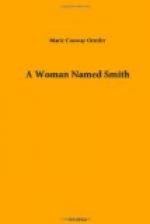A gentle change was creeping over Hynds House, perhaps because of the delightful old ladies who had begun to come there. Old gentlemen, too, formed the pleasant habit of dropping in, beguiled by the artful Author, waited upon son-like by his secretary, foregathered with as kith and kin by the Englishman, mint-juleped by the three of them, enchanted by Alicia, and teaed and caked and beloved by me. Even our cats adored them. The Black family could spot a Confederate veteran as far off as the front gate, and would rush wildly to meet him, rubbing and roaching and purring in and out of his old legs. The Author insisted that their passion for U.C.V.’s was an inherited trait with our cats, and that we ourselves were merely acquired characteristics.
In April, just before Miss Emmeline was to return to Boston, and the Englishman and his daughter were to go back home, Alicia and I decided to give a farewell dance. It was to be in costume.
Hyndsville was pleasantly excited. Never had there been such rummaging of attics, such searchings of old trunks! We rummaged our attic, too. I selected a yellow brocade trimmed with seed-pearls and cascades of lace, and Alicia chose a skimpy blue satin frock with a round neck, an upstanding lace collar, and absurd little puffed sleeves. The Englishman was a Puritan, his daughter a Quakeress, Mr. Johnson a Huguenot Lover, Miss Emmeline a Colonial Lady, Doctor Geddes a bearded and belted Boyar, and The Author a painfully realistic Mephistopheles, his eyebrows corked upward and his mustache waxed into points. Mr. Jelnik sent regrets.
We had waxed the floors, and moved most of the furniture out of the big front drawing-room; and this and the wide halls were used for a ball-room, just as they had been used in the old days. The older people played cards in the living-room and library. Every now and then, between pauses, some masked and brilliant figure, like a bright ghost from the past, would steal in to look over their shoulders and whisper in their ears.
But those grandparents weren’t content to sit down and play cards while others footed it. Not they! They danced the Lancers, and a polka or two, and waltzed and dipped and bowed to “Comin’ through the Rye” while all the masqueraders lined up against the walls to admire and applaud. And after the gayest sort of a buffet supper, the prizes that had been won by a belle and a trooper of ’61—she in her grandmother’s crinoline and he in his grandfather’s gray jacket—were turned over by acclaim to a sprightly lady of seventy and her sprightlier partner of seventy-five, for coming disguised as old folks. The Author made the presentation speech. He began it by saying that in South Carolina any man might well be excused for falling in love with his grandmother.
Then the oldsters began to depart, with laughter and gay good nights. It had been a delightful affair, one of those affairs that go with a swing and a rhythm all their own, and that one remembers with a pleasant taste in the mouth.




